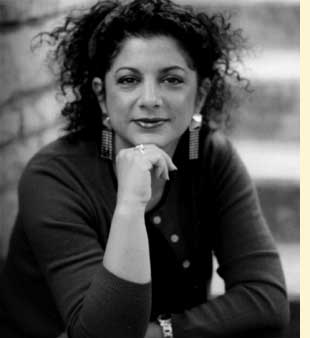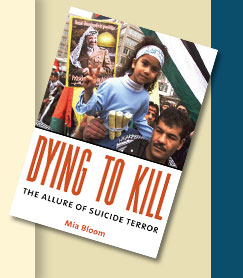UGA’s Terrorism Maven
Mia Bloom’s scholarship and perspectives on such critical topics as suicide bombers, child soldiers, and rape in war enlighten all who will listen.
Her Polish father arrived in Canada in the 1940s with 50 cents in his pocket. Her mother didn’t finish high school. But Mia Bloom now attends meetings of the Council on Foreign Relations. She speaks many languages, flies to Europe, the Middle East, and Washington, D.C., for meetings, readily shares her knowledge of terrorism with military officials and policymakers, and writes articles and books based on her research.
Oh yes, and Bloom, 39, an assistant professor at UGA’s School of Public and International Affairs, carries a full teaching load—to considerable effect. “She’s tough, but you end up taking a lot away from the class,” says student Clare Hatfield. Bloom addresses topics that aren’t covered elsewhere, such as child soldiers, and “if you’re willing to cover a topic, she’ll bend over backward to help you.” Moreover, her enthusiasm is contagious.
But given the violent nature of her subject matter, one may be surprised upon meeting Bloom, a decidedly non-macho and animated individual. “I’m not the typical person to be doing this,” she admits. “I just knew I wanted to make a difference.” And Bloom appears to be making a big difference. Her 2005 book, Dying to Kill: The Allure of Suicide Terror, “is one of the seminal works in the field,” says Bruce Hoffman. “It has provided insight into suicide bombers.”
 Hoffman, a renowned terrorism expert who teaches at Georgetown University, knows Bloom as a colleague, and he has followed her work closely. “She is clearly one of the up and coming junior scholars in terrorism,” he says. “She has a commitment to field work and remarkable linguistic abilities that facilitate that work.” Bloom learned English, French, and Russian while growing up—they were spoken at home—and over the years she added Hebrew, Arabic, Biblical Aramaic, Spanish, Portuguese, a little Serbo-Croatian, and some Tamil.
Hoffman, a renowned terrorism expert who teaches at Georgetown University, knows Bloom as a colleague, and he has followed her work closely. “She is clearly one of the up and coming junior scholars in terrorism,” he says. “She has a commitment to field work and remarkable linguistic abilities that facilitate that work.” Bloom learned English, French, and Russian while growing up—they were spoken at home—and over the years she added Hebrew, Arabic, Biblical Aramaic, Spanish, Portuguese, a little Serbo-Croatian, and some Tamil.
Bloom’s interest in terrorism began in 1990, when she was a master’s degree student in Arab studies at Georgetown University. She later proposed writing her dissertation in political science at Columbia University on a topic such as suicide bombing, “but no one was interested in terror then,” says Bloom, so she chose ethnic conflict. Her doctoral research showed how outside interventions, in countries undergoing civil strife, often make the conflicts worse through ethnic clashes and the killing of civilians.
But when Bloom took a position at Cornell University after she finished her PhD, she returned to her interest in terrorism, aided by a grant from the MacArthur Foundation to study rape and war, child soldiers, and suicide bombing. She took her grant with her when she moved to Princeton University, where she was doing research when the planes hit the World Trade Center and the Pentagon on September 11, 2001.
Bloom began working as a consultant for the New Jersey Office of Counter-Terrorism after 9/11. With an undergraduate degree in Middle Eastern and Islamic studies, and fluency in Arabic, she contributed to numerous outreach programs, one of which arranged for the governor of New Jersey to have dinner at the home of a local Muslim cleric during Ramadan.
Bloom has come to believe that profiling suspects is a crutch, one that gives authorities a false sense of security. For example, Mariel Degauque, a Belgian convert to Islam and a successful suicide bomber, wouldn’t have fit the stereotype of a terrorist because she looked European, not Middle Eastern. Instead of profiling, Bloom advocates reaching out to Muslims.
“We’re so much better at inclusion,” she says. “Europeans have isolated their Muslim communities. But here, they’ve participated in the American dream. Just because someone’s name is Mohammed doesn’t mean he or she is a terrorist.”
What Motivates Suicides
Bloom believes, as does her colleague Robert Pape at the University of Chicago, that the reasons why people blow themselves up are complex. Such individuals likely see suicide as an act of bravery and sacrifice. And while the media makes much of the virgins supposedly awaiting a male suicide bomber after death, this is not the usual motivation. It wouldn’t account for the increasing number of married male bombers and female suicide bombers, she says.
Rather, “they may see suicide as a way of taking control, by saying, ‘I’m choosing the time and place of my death and am not waiting for the enemy to kill me,’” Bloom says. “In Iraq, for example, people all around are dying, and lives are fragile. In their minds, the enemy doesn’t distinguish civilians from insurgents.”
However, she disagrees with Pape that occupation—like that of the U.S. military forces in Iraq—is a sufficient ingredient for creating suicide bombers. As evidence, she points to the 241 suicide bombs that have exploded since 2001 in Pakistan, where there is no foreign occupying presence. Blowing oneself up has become part of the sectarian violence resulting from conflicts over resources, Bloom says.
 Among terrorist groups in Palestine, Turkey, Iraq, and elsewhere, Bloom has found that women members are usually motivated by the “Four Rs”: revenge, redemption, respect, and relationship. In some countries, a woman who has been raped will traditionally isolate herself for life because of the shame. But becoming a suicide bomber gives a woman the opportunity to exact vengeance on the group that violated her, even as she earns the admiration of her revolutionary peers.
Among terrorist groups in Palestine, Turkey, Iraq, and elsewhere, Bloom has found that women members are usually motivated by the “Four Rs”: revenge, redemption, respect, and relationship. In some countries, a woman who has been raped will traditionally isolate herself for life because of the shame. But becoming a suicide bomber gives a woman the opportunity to exact vengeance on the group that violated her, even as she earns the admiration of her revolutionary peers.
As women in Iraq increasingly lose loved ones, Bloom expects to see more of them join the insurgency and succeed in blowing themselves up. Social taboos against touching, much less searching, Muslim women give them a distinct advantage in getting past checkpoints and security forces. Women pretending to be pregnant, for example, may carry bombs under their clothes and proceed undetected. The woman who in 1991 blew herself up and killed Rajiv Ghandi, the former prime minister of India, employed such a ruse.
Sharing Insights
Besides the positive feedback from her solid research and writing, Bloom has gained stature in international circles largely because of “my hunches,” she says. At a book signing in New York on July 6, 2005, shortly after Dying to Kill had been published, someone asked her if there would soon be another terrorist attack on the United States. She replied that it would happen in Europe. The next day, bombs went off in the subway system in London.
In 2006, Bloom was one of a group of 25 experts called to Washington to brief General John Abizaid, then commander of U.S. Central Command in Iraq, about what to do with the war. Bloom wanted to tell Bush administration officials to get out of Iraq. With Americans occupying the country, she felt that sectarian interests would arise and dominate the political landscape, divisions would overcome any progress, and foreigners would infect the country. But she didn’t have the chance.
“We found out that talking about the end of the war was off the table,” Bloom said. “You got the sense that they didn’t give two hoots about what we had to say. I decided I could have a bigger impact in the classroom.”
She has certainly had such an impact, particularly on Hatfield, a Foundation Fellow from Alpharetta. Encouraged by Bloom, Hatfield presented a paper—on rape as a tactic of war during India’s partition—at the 2007 annual conference of the American Political Science Association. In fact, at age 20, she was the youngest person ever to make a presentation to the organization. Now, Hatfield wants to go to Bangladesh to do field work on the topic.
“Dr. Bloom is just great,” Hatfield says of her mentor.
On the few occasions when Bloom finds time to relax—when she’s taking a break from her latest book project, the emails are all returned, and the papers are graded—she unwinds by cooking, creating dishes based on a wide variety of ethnic cuisines. It helps that she attended Le Cordon Bleu, the famous school for chefs, in Montreal—her home town.
Actually, it seems that whatever Bloom does, she insists on doing it well. She is driven in part by the legacy of her father, Joe Grynwald, who died in 2005. During World War II, as part of the resistance movement in Poland, he managed to help 15 Jewish families escape to Azerbaijan.
“He saved these people’s lives,” Bloom says. “And because their descendants are living in Israel, he effectively saved hundreds of people. So, I have big shoes to fill.”
For more information, contact Mia Bloom at: mbloom@uga.edu.
(Athens writer Rebecca McCarthy is on the staff of the Atlanta Journal-Constitution).
 |


